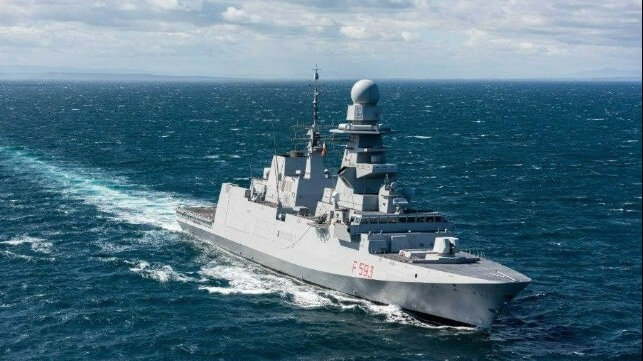Italian & US Navy Vessels to Use Parker altair Neptune Filtration

[By: Parker Gas Turbine Filtration]
When building frigates for close combat, the selection of the filtration system for the engine turbines may not seem the most vital aspect, but is essential for reliable operation and to enable the ship to respond swiftly. The Italian and, more recently, US Navy have both commissioned FREMM (Frégates Européennes Multi-Missions) and FFG62 Constellation Class Guided Missile Frigates respectively, built by a major Italian ship builder at its Italian and US shipyards. The aero derived gas turbines powering these ships, and configured for marine applications will be protected by Parker altair® Neptune filtration systems.
The leading Parker altair® Neptune filtration systems are designed to ensure a clean, reliable supply of air to the gas turbine inlet. Downstream Salt concentration is 0.0025ppm v NGTE 30 knot aerosol. Equivalent to 99.93% salt removal efficiency, vital for offshore operation. They are also ultra-compact and light, making them ideal for use on such vessels. Critically, the system comprises a three-stage solution, including marine vane separators and coalescer/filters, which provides the high efficiency and performance required for use in military vessels.
As part of a long-term contract, Parker has supported the multi-FREMM development program and has already delivered 10 FREMM ship sets for the Italian Navy. This engagement has been extended with an order for an additional two, for delivery in 2022. The recent order for the FFG62 frigates for the US Navy was received last year and ultimately will extend to 10 ship sets over the next six years, with the first planned for delivery next year.
The FFG62 is part of the US Navy Small Surface Combatant (SCC) program and has a wider and more elongated hull relative to the parent design of the FREMM. The procurement of these vessels supports the Navy’s force-level goal of a 52 SCC force within the current 355 total ship plan.
Frigates are designed for speed and manoeuvrability. This makes the delivery of GT spec compliant air to the propulsion systems (gas turbine) vital to the mission. A well-designed air intake system not only delivers clean air but also facilitates maintenance activities such as filter cleaning or changeout and drainage inspections. Anti-ice systems and automatic by-pass doors are also part of the scope.
The Neptune filter system is suitable for gas turbines and, on the FFG62 vessels, also the diesel generators. By using these state-of-the-art filters, both navies will be assured of reliable operation and, by protecting the efficiency of the turbines,
Gerald Woodward, Division Sales & Marketing Manager at Parker, said, “We are delighted to be supplying further ship sets for the Italian vessels and with the new contract for the US Navy. These systems are well proven and their light, compact form means they are ideal for a wide range of vessels. Their advanced design ensures reliable, robust operation and fewer filter changeouts, making them ideal for use in a marine environment.”

that matters most
Get the latest maritime news delivered to your inbox daily.
Turbine internals are easily damaged by the corrosive nature of salt. The first stage of the Neptune system removes bulk water from rain, sea spray and aerosols. In the second stage, a coalescer removes dust and solid contaminants as well as fine aerosols by coalescing them into larger droplets. The third stage uses a vane separator to remove concentrated saline solutions that have passed through the first stages.
Woodward concluded, “The Neptune system is proven to provide exceptional salt removal. Its use in these naval applications reflects the confidence shipbuilders and turbine OEMs have in its design and operation.”
The products and services herein described in this press release are not endorsed by The Maritime Executive.
